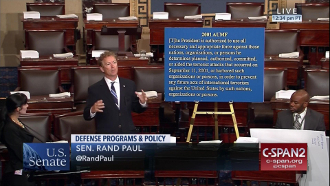Sen. Rand Paul (R-KY) had to push heavily and very publicly against the Senate leadership to get even the limited debate that ultimately occurred on his amendment, aiming to revoke the 2001 Authorization for the Use of Military Force (AUMF). The vote did not occur. In the middle of the debate Sen. Bob Corker (R-TN) moved to table (kill) the amendment, forcing an immediate vote. The Senate then voted to kill Paul’s amendment, by a vote of 61-36.
 The post-9/11 AUMF has been interpreted broadly by US presidents as allowing unlimited war-making powers against anything even loosely described as “terror.” Sen. Paul argued that the AUMF was wrongly been used to authorize seven distinct wars, and that repealing it would force Congress to debate specific authorizations for specific wars as an alternative.
The post-9/11 AUMF has been interpreted broadly by US presidents as allowing unlimited war-making powers against anything even loosely described as “terror.” Sen. Paul argued that the AUMF was wrongly been used to authorize seven distinct wars, and that repealing it would force Congress to debate specific authorizations for specific wars as an alternative.
While he’d hoped this would bring in support not only from opponents of the war, but from hawks eager to get their votes on the record to authorize these many, effectively unauthorized wars, little support ultimately materialized. In addition to Sen. Paul, speaking in favor during the debate were Sens. Ben Cardin (D-MD), Chris Murphy (D-CT), and Dick Durban (D-IL).
This was driven in no small part by objections from the Senate’s Republican leadership. Senate Majority Leader Mitch McConnell (R-KY) argued that supporting an all-volunteer military meant keeping the old AUMF in place to prove Congress’ support for all those wars. Many hawks, like Sen. John McCain (R-AZ), were said to be concerned that new, specific AUMFs would limit to scope of America’s wars, whereas the status quo is an AUMF that isn’t directly applicable, and subsequently includes no direct limits that anyone is complying with.
The vote on tabling the amendment isn’t necessarily indicative of where senators would’ve voted on Sen. Paul’s actual amendment. Sen. Dianne Feinstein (D-CA), for instance, opposed Corker’s move to kill the amendment, but would’ve been unlikely to vote for the amendment itself.
While the failure of the amendment doesn’t preclude future efforts at passing new AUMFs to cover America’s many wars, it makes such debate a less pressing matter. Talk of an AUMF for the ISIS wars, put off since the 2014 mid-term elections on various reasons, can be expected to remain just talk, and no real advance on the effort is likely.


